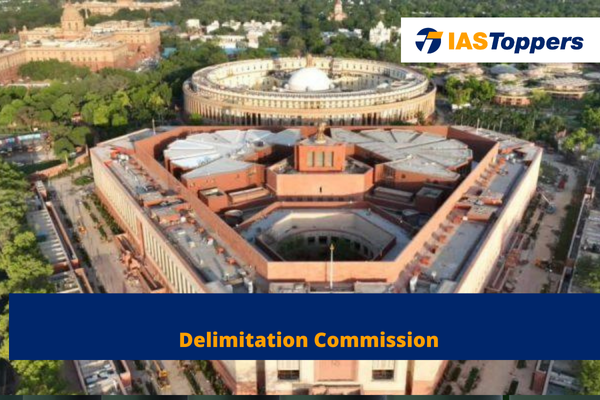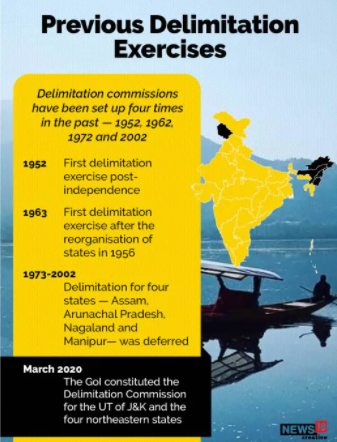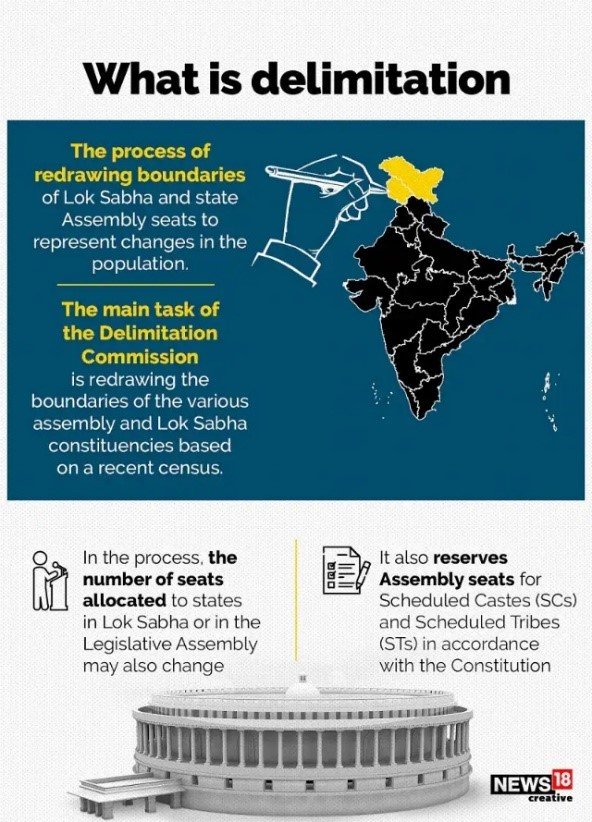Delimitation refers to the process of setting the boundaries for electoral constituencies, a task performed by the Delimitation Commission in India. The objective is to ensure fair representation based on demographic changes, promoting a level playing field for all political parties. Delimitation influences the democratic processes, contributing to the equitable distribution of political power. In this article, you will learn about meaning and definition of delimitation, objective and function of Delimitation commission of India, Process of delimitation etc. all of which are very important topic for GS Paper-2 Polity & Governance of UPSC CSE Exam. To explore more interesting UPSC Polity concepts similar to Delimitation Commission, check out other articles of IASToppers.
Table of Content
- What is delimitation?
- What is the objective of delimitation?
- What is Delimitation commission of India?
- Functions of the Delimitation Commission
- How is delimitation done?
- Who are the members Delimitation Commission of India?
- Process of delimitation in areas which have disadvantaged groups
- How many times Delimitation commissions have been set up?
- Why was delimitation skipped after the 1981 and 1991 censuses?
- Why next delimitation is suspended till 2026?
- What is Jammu Kashmir delimitation commission?
- Challenges of Delimitation
- Conclusion
- Delimitation Commission FAQ
What is delimitation?
Alt-text: What is delimitation?
- Delimitation means the act or process of fixing limits or boundaries of territorial constituencies in a country or a province having a legislative body.
- In other words, it is the act of redrawing boundaries of Lok Sabha and Assembly seats to represent changes in population.
- This exercise is carried out by a Delimitation Commission, whose orders have the force of law and cannot be questioned before any court.
Constitutional provisions:
- Article 82: This provides the Parliament with the authority to enact a Delimitation Act after every Census or 10 years.
- Article 170: This provides for the States to get divided into territorial constituencies as per the Delimitation Act after every Census.
- The Union government sets up a Delimitation Commission once the Act is in force.
What is the objective of delimitation?
- To reflect the demographic changes in a state, Union Territory or at the national level.
- To ensure uniformity between the different constituencies in the same state so that no political party has an advantage.
- To create a level playing field in terms of the number of voters to all political parties or candidates contesting elections
What is Delimitation commission of India?
- The Delimitation commission or Boundary commission of India is a commission established by the Government of India under the provisions of the Delimitation Commission Act.
- The main task of the commission is redrawing the boundaries of the various assembly and Lok Sabha constituencies based on a recent census.
- The representation from each State is not changed during this exercise.
Functions of the Delimitation Commission
- Determine the number and boundaries of constituencies to ensure that each constituency has a roughly equal number of voters.
- Identifies the seats to be reserved for the scheduled castes and scheduled tribes communities, in areas where their population is significant.
- Shares preliminary draft proposals with the public via the Indian Gazette, state official gazettes, and newspapers in local languages.
- Arranges public sessions to listen to the views of the public, either in written or verbal form.
- If deemed necessary, modifications are made to the preliminary proposal.
- The final order is published in the Gazettes and comes into effect by a date specified by the President.
How is delimitation done?
- The Union government constitutes a Delimitation Commission headed by a retired Supreme Court judge.
- The commission examines population data, existing constituencies, and the number of seats to be analysed.
- The commission publishes a draft report in the Gazette of India, the official gazettes of the states concerned, and at least two vernacular publications.
- The commission seeks feedback from the general public on its draft report and makes changes if required.
- The commission publishes its final order in the Gazette of India.
- The final order of the Delimitation Commission forms the basis for all future elections until the next delimitation.
Who are the members Delimitation Commission of India?
The Delimitation Commission is appointed by the President of India in collaboration with the Election Commission of India.
It has three members:
- Chairperson: A serving or retired judge of the Supreme Court
- Chief Election Commissioner or the Election Commissioner nominated by the CEC
- State Election Commissioner as ex-officio members
- Five MPs and five MLAs of the state are chosen as associate members of the commission.
Process of delimitation in areas which have disadvantaged groups
- Delimitation in areas with disadvantaged groups is done by reserving a certain number of constituencies for those groups.
- The number of reserved constituencies is determined by the proportion of disadvantaged groups in the population of each state.
- The Delimitation Commission then draws the boundaries of the constituencies so that the reserved constituencies have a higher proportion of disadvantaged groups than the unreserved constituencies.
- In the case of Scheduled Castes, the Delimitation Commission also spreads the reserved constituencies across different regions of the state.
- This is done to ensure that all regions of the state have a voice in the political process.
- The Constitution of India does not make similar reservations for other disadvantaged groups.
- However, some states have their own laws that reserve seats for other disadvantaged groups, such as women or religious minorities.
How many times Delimitation commissions have been set up?
Alt-text: Delimitation commissions
- In India, such Delimitation Commissions have been constituted 4 times:
- 1952 under the Delimitation Commission Act, 1952
- 1963 under Delimitation Commission Act, 1962
- 1973 under Delimitation Act, 1972
- 2002 under Delimitation Act 2002
- Following the 84th amendment to the Constitution, in 2002, Delimitation is to be done in 2026 if not postponed.
- The base year will be 2021 population. However, the population control policy will be kept in center of this.
Why was delimitation skipped after the 1981 and 1991 censuses?
- The Indian Constitution requires that the number of seats in the Lok Sabha for each state be proportional to its population.
- However, this meant that states with higher population growth rates (states that took little interest in population control) could end up with more seats in Parliament, while states with lower population growth rates could end up with fewer seats.
- This was seen as unfair, and so the Constitution was amended in 1976 to suspend delimitation until 2001.
Why next delimitation is suspended till 2026?
- Due to the 84th Amendment to the Constitution, the next delimitation is suspended till 2026, by when the country was projected to achieve a uniform population growth rate.
- The amendment also introduced the concept of “one person, one vote,” which means that each voter should have an equal say in the political process. This raises the question of whether it is fair for states with higher population growth rates to have more seats in Parliament than states with lower population growth rates.
What is Jammu Kashmir delimitation commission?
- The Jammu and Kashmir Reorganisation Act, 2019, has led to the bifurcation of the state of Jammu and Kashmir into two union territories, namely Jammu and Kashmir, and Ladakh.
- The delimitation of constituencies in these two union territories is yet to be undertaken.
Challenges of Delimitation
- Population imbalance: The delimitation process in India is designed to ensure that each constituency has a roughly equal number of voters. However, this can lead to population imbalance, with some states having more seats in the Parliament than others, even though they have the same population. This can give an unfair advantage to states with larger populations.
- Political interference: The delimitation process is often politicized, with political parties trying to influence the boundaries of constituencies in their favor. This can lead to gerrymandering, which is the practice of drawing electoral district boundaries to favor one party or class.
- Lack of transparency: The delimitation process is often opaque, with the public not being given enough information about how the boundaries are being drawn. This can lead to suspicion and mistrust.
- Technical challenges: The delimitation process is complex and time-consuming, and it can be difficult to draw boundaries that are both fair and impartial. This is especially challenging in large and diverse countries like India.
- Cost: The delimitation process is expensive, and it can be difficult to get the necessary funding. This can delay or even prevent the delimitation process from being carried out.
- Cap on the maximum number of seats: The Constitution of India has put a cap on the maximum number of seats in the Lok Sabha to 550 and Rajya Sabha to 250. This means that the delimitation process cannot increase the number of seats in the Parliament, even if the population of India increases. This can lead to an increasing number of people being represented by a single representative, which can make it difficult for their voices to be heard.
Conclusion
Delimitation Commission plays a crucial role in ensuring fair representation and maintaining the democratic spirit of India. By periodically redrawing the boundaries of constituencies based on demographic changes, the commission works to create a level playing field for all political parties and candidates. Although the delimitation process has faced challenges in the past, it remains an essential component of India’s electoral system, fostering a more equitable and inclusive democracy for the country’s diverse population
FAQs (Frequently Asked Questions)
Who is the chairman of delimitation commission?
The Chairperson Delimitation Commission of India is a retired Judge of the Supreme Court of India Justice Ranjana Prakash Desai.
What is the meaning of delimitation of constituencies?
Delimitation of constituencies is the process of redrawing the boundaries of electoral constituencies. This is done to ensure that each constituency has a roughly equal number of voters, and that the boundaries are drawn in a fair and impartial manner.
What are the benefits of delimitation?
Delimitation helps to ensure that all citizens have an equal say in the political process. It helps to prevent the over-representation of any particular group of people. It also helps to ensure that the boundaries of constituencies are fair and impartial
What are the challenges of delimitation?
: Delimitation can be a complex and time-consuming process. It can be politically sensitive, as it can affect the number of seats that each party has in the legislature. It also can be expensive, as it requires the collection and analysis of large amounts of data.



